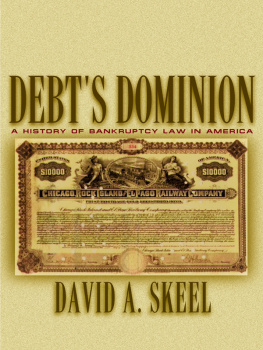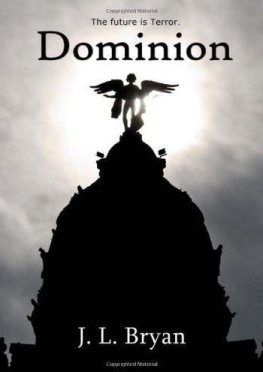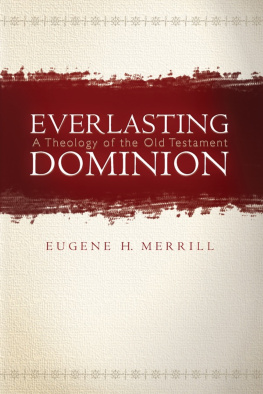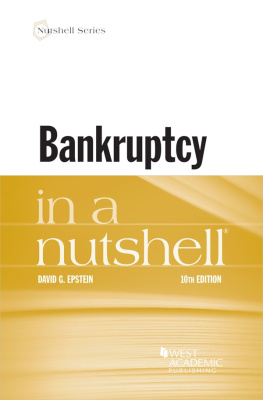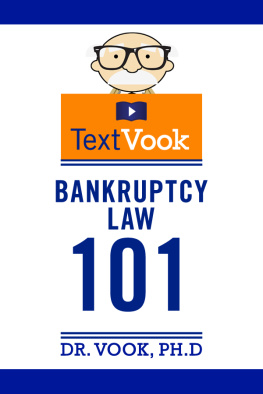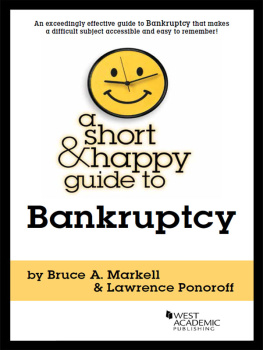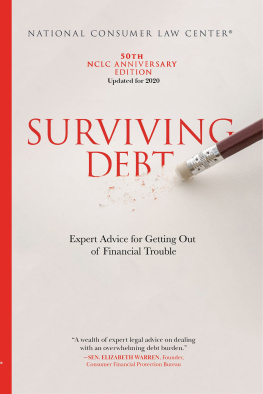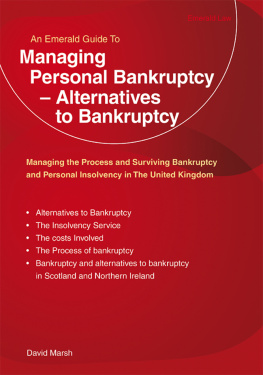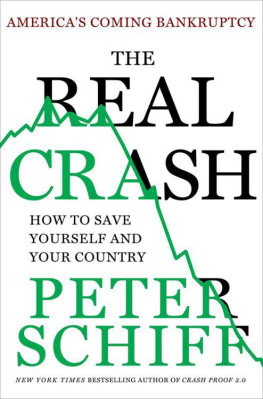Skeel - Debts Dominion: A History of Bankruptcy Law in America
Here you can read online Skeel - Debts Dominion: A History of Bankruptcy Law in America full text of the book (entire story) in english for free. Download pdf and epub, get meaning, cover and reviews about this ebook. City: Princeton;NJ;USA, year: 2014, publisher: Princeton University Press, genre: Home and family. Description of the work, (preface) as well as reviews are available. Best literature library LitArk.com created for fans of good reading and offers a wide selection of genres:
Romance novel
Science fiction
Adventure
Detective
Science
History
Home and family
Prose
Art
Politics
Computer
Non-fiction
Religion
Business
Children
Humor
Choose a favorite category and find really read worthwhile books. Enjoy immersion in the world of imagination, feel the emotions of the characters or learn something new for yourself, make an fascinating discovery.
- Book:Debts Dominion: A History of Bankruptcy Law in America
- Author:
- Publisher:Princeton University Press
- Genre:
- Year:2014
- City:Princeton;NJ;USA
- Rating:5 / 5
- Favourites:Add to favourites
- Your mark:
- 100
- 1
- 2
- 3
- 4
- 5
Debts Dominion: A History of Bankruptcy Law in America: summary, description and annotation
We offer to read an annotation, description, summary or preface (depends on what the author of the book "Debts Dominion: A History of Bankruptcy Law in America" wrote himself). If you haven't found the necessary information about the book — write in the comments, we will try to find it.
Skeel: author's other books
Who wrote Debts Dominion: A History of Bankruptcy Law in America? Find out the surname, the name of the author of the book and a list of all author's works by series.
Debts Dominion: A History of Bankruptcy Law in America — read online for free the complete book (whole text) full work
Below is the text of the book, divided by pages. System saving the place of the last page read, allows you to conveniently read the book "Debts Dominion: A History of Bankruptcy Law in America" online for free, without having to search again every time where you left off. Put a bookmark, and you can go to the page where you finished reading at any time.
Font size:
Interval:
Bookmark:

DEBTS DOMINION
DEBTS DOMINION
A HISTORY OF BANKRUPTCY LAW
IN AMERICA
DAVID A. SKEEL, JR.
PRINCETON UNIVERSITY PRESS
PRINCETON AND OXFORD
Copyright 2001 by Princeton University Press
Published by Princeton University Press, 41 William Street,
Princeton, New Jersey 08540
In the United Kingdom: Princeton University Press,
3 Market Place, Woodstock, Oxfordshire OX20 1SY
All Rights Reserved
Library of Congress Cataloging-in-Publication Data
Skeel, David A. Jr. 1961
Debts dominion: a history of backruptcy law in America / David A. Skeel, Jr.
Includes bibliographical references and index.
ISBN 0-691-08810-1 (CL : alk. paper)
1. BankruptcyUnited StatesHistory. 2. BackruptcyPolitical aspects
United StatesHistory. I. Title.
KF1526 .S59 2001
346.730789dc21 2001021464
This book has been composed in Electra
www.pup.princeton.edu
Printed in the United States of America
10 9 8 7 6 5 4 3 2 1
For Sharon
and for my parents
PREFACE
T his book is the culmination of a scholarly and professional journey that began well over a decade ago, with a bankruptcy class I took in my final year of law school. Like most literature majors who wind up in law school, I knew little about business and finance, and even less about bankruptcy, when I arrived. I signed up for the bankruptcy class only because of my admiration for the gifts of the professor who would be teaching it. Despite this unenthusiastic beginning, I, like many of the other students in our very large class, found the travails of financially troubled individuals and corporations riveting. It also became clear that American bankruptcy law touches on all aspects of American life. Within a few years, I found myself writing a law school paper on bankruptcy, practicing in a law firms bankruptcy department, and then continuing to pursue the interest in academia.
In those days (the mid 1980s), bankruptcy law had achieved a new prominence. Although bankruptcy had previously been obscure and faintly unsavory, Congress had completely rewritten the bankruptcy laws only a few years before. In that bankruptcy class, and among bankruptcy professionals, the new law (the Code) was portrayed in the most exalted of terms. The Code was sweetness and light, and everything good, whereas the old law (the Act) had been archaic, cumbersome, and ineffective. Bankruptcy practice, if not bankruptcy itself, had become almost cool.
Shortly after I left law school, I learned that the history of American bankruptcy laws actually was more complicated (and even more interesting) than I had initially realized. The old law may have been archaic and cumbersome, but it had a rather remarkable pedigree. The last major reform had been passed by Congress during the Great Depression. Many of its most important provisions had been drafted by William Douglas, who was appointed to the United States Supreme Court by President Roosevelt shortly thereafter, and went on to serve longer than any other justice in history. (William Brennan described Douglas as one of the two geniuses he had known in his life.) Douglas had worked on the project with a variety of other prominent New Deal reformers. In its own time, Douglass handiwork had itself been seen as a milestone in progressive, up-to-date legislation for resolving the age-old problem of financial distress.
The puzzle of how a law with such an impressive lineage came to seem so misguided was only the first of many puzzles I encountered along the way. The enigmas are hardly surprising, given the conflicting reactions bankruptcy has always evoked in Americans. We think that honest but unfortunate debtors are entitled to a fresh start, but we also believe that debtors should repay their creditors if they can. This tension, and others like it, has projected bankruptcy onto center stage in every generation of the nations history.
As this book goes to press, bankruptcy has once again captured lawmakers attention in Washington. Congress is poised to pass the most significant bankruptcy reforms in over twenty years. The legislation, much of which focuses on consumer bankruptcy, is designed to require more debtors to repay at least some of their debts. Scarcely a day goes by without a major newspaper story either praising (because too many debtors take advantage of the system) or vilifying (because its simply a sop to heartless credit card companies) the proposed reforms. At the same time, a souring economy has led to a spate of new, high-profile corporate bankruptcies, ranging from TWA to Pacific Gas & Electric, one of Californias two major utilities. The shock of financial distress is not a new story, and it never grows old.
Like most books, this one has benefitted from the comments and suggestions of a wide range of individuals. I am especially grateful to Douglas Baird and Howard Rosenthal, each of whom served as a referee for the book, and to Brad Hansen. All three provided extensive written commentary on the entire book. Steve Burbank, Eric Posner, and Bob Rasmussen also provided extremely helpful comments on the entire manuscript. I received valuable comments on individual chapters of the manuscript from Patrick BoHon, Nicholas Georgakopoulos, Melissa Jacoby, Richard Levin, Chuck Mooney, Frank Partnoy, Joseph Pompykala, Tom Smith, Emerson Tiller, Todd Zywicki, Howard Rosenthals Politics and Finance class at Princeton University, and the participants at faculty workshops at Princeton University and the University of San Diego School of Law. Michael Berman of the Securities and Exchange Commission was an invaluable source of information about the SECs role in bankruptcy; and Harvey Miller and Ron Trost provided helpful information about the 1978 Code and current bankruptcy practice.
I owe special thanks to Peter Dougherty, my editor at Princeton University Press, who was a constant source of encouragement and insight, from his email messages before the book was accepted for publication (telling me to keep the faith) to his editorial suggestions on the book. Thanks also to Richard Isomaki for meticulous copyediting and to Bill Laznovsky for his work at the production stage.
Several libraries and librarians also proved invaluable during the course of the project. I am especially grateful to Bill Draper of the Biddle Law Library of the University of Pennsylvania Law School. Bill helped with the research, handled my sometimes onerous requests with unfailing good cheer, and provided a variety of helpful suggestions. I also owe thanks to Ron Day of the Biddle Law Library, John Necci and Larry Reilly of the Temple University School of Law Library, and to the librarians of the Library of Congress.
As I worked on the book, I wrote a number of articles for legal periodicals that touched on the research in one way or another. Although I wrote the book from scratch, some aspects of the analysis and occasional passages are drawn from the articles. The editors of the following pieces have kindly permitted me to reprint passages from the articles: Public Choice and the Future of Public Choice Influenced Legal Scholarship, 50 Vanderbilt Law Review 647 (1997); The Genius of the 1898 Bankruptcy Act, 15 Bankruptcy Developments Journal 321 (1999); Vern Countryman and the Path of Progressive (and Populist) Bankruptcy Scholarship, 113 Harvard Law Review 1075 (2000); and Whats So Bad About Delaware, 54 Vanderbilt Law Review (2001). I have cited several other articles in the relevant endnotes.
Finally, my biggest debt of all is to my family. My wife Sharon has been a loving companion for thirteen years now, and has often put her own research on hold during the life of this project. My parents have been a continual support from my earliest years. And my sons, Carter and Stephen, are a continual blessing.
Next pageFont size:
Interval:
Bookmark:
Similar books «Debts Dominion: A History of Bankruptcy Law in America»
Look at similar books to Debts Dominion: A History of Bankruptcy Law in America. We have selected literature similar in name and meaning in the hope of providing readers with more options to find new, interesting, not yet read works.
Discussion, reviews of the book Debts Dominion: A History of Bankruptcy Law in America and just readers' own opinions. Leave your comments, write what you think about the work, its meaning or the main characters. Specify what exactly you liked and what you didn't like, and why you think so.

